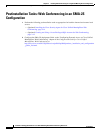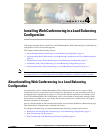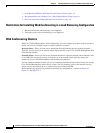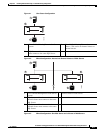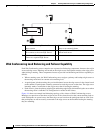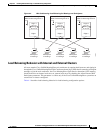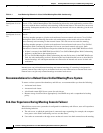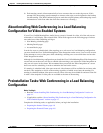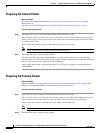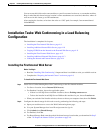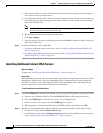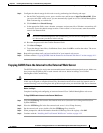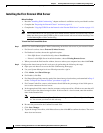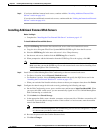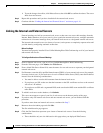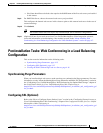
4-8
Installation and Upgrade Guide for Cisco Unified MeetingPlace Web Conferencing Release 6.x
OL-13418-01
Chapter 4 Installing Web Conferencing in a Load Balancing Configuration
Preinstallation Tasks: Web Conferencing in a Load Balancing Configuration
Preparing the Internal Cluster
Before You Begin
Review the “Load Balancing Requirements” section in System Requirements for Cisco Unified
MeetingPlace at
http://www.cisco.com/en/US/products/sw/ps5664/ps5669/prod_installation_guides_list.html.
To Prepare the Internal Cluster
Step 1 Determine and create a common domain Windows administration account.
This account is used by all of the web servers in this cluster. It starts Web Conferencing services and
allows all web servers in this cluster to access the shared storage location by using a Universal Naming
Convention (UNC) path.
After creating the account, write down the value, which you will need later.
Note Enter different values for your internal and external clusters.
Step 2 Determine and create a shared storage location.
You can create this folder on the same machine as your first internal web server, or on a separate
machine. Keep in mind that this shared storage location is where attachments are stored and, therefore,
where all web servers in this cluster go to find attachments.
After creating the location, write down the value as a UNC path, for example, \\servername\shared
folder\MPWeb.
Preparing the External Cluster
Before You Begin
(Optional) Read the “Installing Web Conferencing for a Segmented Meeting Access Configuration”
chapter to understand the difference between internal and external servers.
To Prepare the External Cluster
Step 1 Determine and create a common domain Windows administration account.
This account is used by all of the web servers in this cluster. It starts Web Conferencing services and
allows all web servers in this cluster to access the shared storage location using a UNC path.
After creating this account, write down the value, which you will need later.
Note Enter different values for your internal and external clusters.
Step 2 Determine and create a shared storage location.



